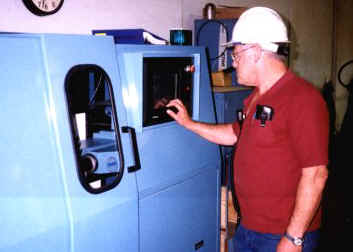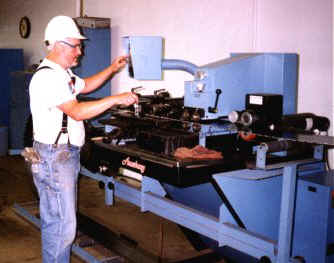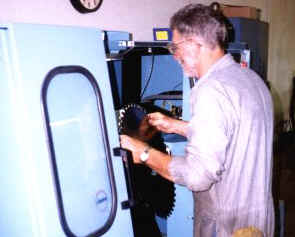| Previous Page | Table of Contents | Next Page |
Willamette Industries'
Experienced People + New Technology = Success
The sawmill at Coburg has been in operation since 1962. Previously operated as a dimension and cutting mill for logs up to 60" (1.5 meters) diameter, it was no longer suitable for the small log supply now available. After Willamette acquired the mill in the early 90s, it was rumored that Coburg could be added to the list of permanently closed Oregon mills.
 |
| Head Filer Cliff Belcher at the controls of the Armstrong circle saw Leveler. "Automatically leveled saws are flatter and they cut better" said Cliff. |
Instead, Willamette Industries kept their skilled work force and built a new sawmill on this site to process second growth Douglas Fir and Hemlock logs with an average diameter of 6.8" (175 mm). Today, the Coburg mill produces 750,000 board feet (880 cubic meters) of lumber in two 10-hour shifts.
"We decided we would need a state-of-the-art filing program for our state-of-the-art mill," Coburg head filer Cliff Belcher explains. "We replaced 40-year old sharpeners with brand new equipment. We introduced Stellite tipping and automatic leveling, technology that wasn’t even available the last time this mill bought new filing room equipment. Experienced people working with new technology is the combination that allows us to meet our goals of increased production and top quality lumber."
| "Automatically leveled saws are flatter and they cut better" |
In the sawmill, Willamette installed the first curve sawing rotary gang ever made by the Schurman division of USNR. This new double arbor gang takes a 12" (300 mm) maximum cant. Their curve-sawing edger uses 36 saws, which are changed twice each shift. The big conventional swaged tooth band headrig was replaced with a Stellite tipped quad band. Only three weeks of production was lost making the changeover.
 |
| Gary Hardegger punches up data for the head rig band saw on the Leveler touch screen. Everyone in the filing room is trained to run every machine. |
"At first, we were averaging more than 100 saws every shift from the curve sawing gang." Cliff reports. "Mike Neveau and I knew we needed help keeping up with that many saws. We took several saws up to the Armstrong factory to run across their new circular saw Leveler. Our Armstrong band saw leveler was doing a good job for us and we hoped the circle saw machine would, too. Although we had never run the circle saw machine before, we loaded the first edger saw and were leveling it within just a few minutes".
"The automatically leveled saws are flatter and they cut better" Cliff says. "Now that every circle saw is leveled after each 5 hour run, our down time has been reduced, saw costs are lower and we spend less time leveling saws. We have reduced both the kerf and the target size in our curve sawing machine."
| "We have reduced kerf and
target size in our curve sawing machine" |
"Just about everything in the filing room is new, except for the people," says Allan Whitney, round saw benchman who has worked at the Coburg mill for more than 16 years. "Everything works better than the old machines. But if I could only keep one new machine, it would be the circle saw leveler. It is fast, accurate and easy to run. We just have too many saws to try to keep up the old way."
 |
| Round saw benchman Allan Whitney loads a saw on the circle saw Leveler. Since installing the automatic Leveler, they have reduced both kerf and the target size on the curve sawing gang edger. |
Willamette recently added an Armstrong No. 4 band saw sharpener that was rebuilt to the Armstrong factory specs by Cascade Southern Saw, Armstrong’s Stocking Distributor/Service Center serving the Coburg mill. It has a StrongArm II power clamp, heavy-duty rocker arm assembly, SideWinder feed finger for Coburg’s Stellite tipped saws, a self-cleaning carbide faceplate, and poly-V belt drive. "It is not surprising that this sharpener runs just like new ... practically everything on it is new," said Cliff. "You would never know the machine is over 20 years old."
| "The factory rebuilt No. 4 sharpener runs just like new" |
Cliff’s filing crew includes Whitney, Rick Getchell, Gary Hardegger, Gerald Yarber, Ken Bergstrom, Rocky Mayhugh and Will Tanner. Between them, they have over 100 years of filing experience. "Everyone in the filing room is trained to run every machine, Cliff reports. "We all work together to get the job done." Mike Neveau is the filing supervisor for Willamette’s sawmills at Coburg and nearby Dallas, Oregon.
| Previous Page | Table of Contents | Next Page |